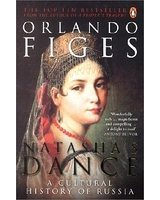A CULTURAL HISTORY OF RUSSIA
By Orlando Figes
Many nations have rich cultural histories. The first that will jump to mind are China, Japan, Russia, Italy and Spain. Trying to find a good reading reference to any of those cultures one has mostly to refer to textbooks or pictorials without much content. But there are very few books written which can encompass the whole cultural scene in comprehensive and lively ways. Natasha’s Dance is such a book.
The title of Natasha’s Dance comes from War and Peace, when the aristocratic heroine, Natasha Rostova, finds herself intuitively picking up the rhythm of a peasant dance… Though Natasha has never before heard this folk song, it stirs some unknown feeling in her heart; then Natasha throws off the shawl from her shoulders and does the dance with such complete precision that brought tears to everyone in her uncle’s simple wooden cabin.
The book is an inspiring masterpiece on Russian Culture, with richness of detail, examples and quotes from major cultural events, writers, painters, musicians and other artists throughout Russian history. This is the book that makes you realize that [the Russian people is not just a people, it is a humanity]. You will also learn more about:
- Old Russian culture
- The search for the Russian Soul
- Peasantry and the children of 1812
- The legends of Kitezh and Belovode
- Gogol, Dostoevsky, Pushkin and Tolstoy
- Nijinsky’s dance and Stravinsky’s music
- Sergei Diaghilev and the creation of the Opera Russe
- The matrioshka, or Russian nesting doll of Maliutin
- The "Russian Principle" of Christian love
- The holy and the beautiful in Russia‘s Orthodox faith
- The Russian Orthodox Service as an emotional experience
- The struggle for human dignity after centuries in the mud and filth
- And how the stoicism of Russian peasants assumed the status of a cultural myth.
The book also shows the difference between European Reason and the Russian heart or ‘soul’, and the triumph of a truly Russian self that had been concealed and suppressed by the Western conventions of Peter the Great and Petersburg’s westernized society; and eventual success of Russia’s spiritual traditions as different from, and indeed superior to those of the West; as Karamzin comments in one of his writings defending the Russian language:
Our language is capable not only of the eloquence, of sonorous descriptive poetry, but also of tender simplicity, of sounds of feeling and sensibility. It is richer in harmonies than French; it lends itself better to effusions of the soul… Man and nation may begin with imitation but in time they must become themselves to have the right to say: ‘I exist morally!’
I find myself musing about books quite often, because reading has sometimes been my nocturnal friend. It brings me pleasure and sometimes intoxication – whether the subject is culture, history, music or fiction; and all I needed to finish this book – a glass of Vodka and some notes from The Rite of Spring…
